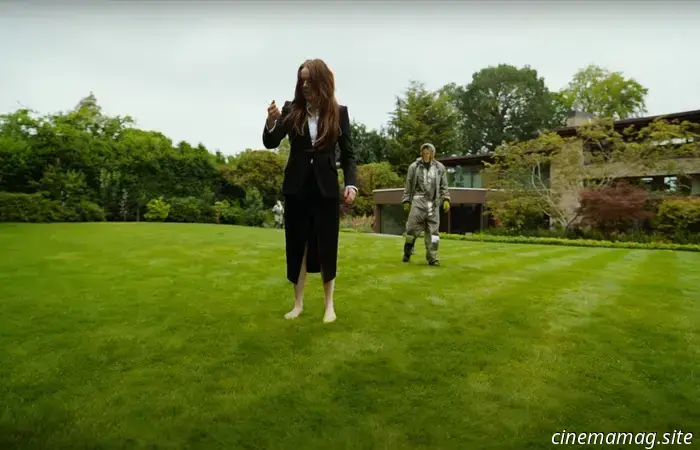-Movie-Review.jpg)
Sorry, Baby (2025) - Film Review
Sorry, Baby, 2025.
Written and Directed by Eva Victor.
Featuring Eva Victor, Naomi Ackie, Lucas Hedges, John Carroll Lynch, Louis Cancelmi, Kelly McCormack, Liz Bishop, Chhoyang Cheshatsang, Marc Carver, Jordan Mendoza, Celeste Oliva, Jesse Gabbard, Anabel Graetz, Natalie Rotter-Laitman, Lucien Spelman, Priscilla Manning, and Conor Sweeney.
SYNOPSIS:
Something troubling occurred to Agnes. However, life continues for those around her.
Following her traumatic experience, Eva Victor’s Agnes speaks to a doctor about what happened. Although the comedian’s directorial debut, Sorry, Baby, addresses familiar heavy themes, it occasionally does so with a sharp, darkly comedic flair that captures the frustrating indifference some survivors encounter, rather than simply exploiting tragedy for cheap laughs. Given the intricate nature of the character's emotions regarding life post-incident, this is a finely balanced execution that only someone with Eva Victor’s talent could achieve, complemented by her lead performance. In essence, it's an exceptionally intricate debut in filmmaking and acting.
Presented in a nonlinear format (though most of the film unfolds sequentially), Agnes is excited to reconnect with her gay best friend Lydie (wonderfully portrayed by Naomi Ackie, who embodies the kind of empathetic, patient friend everyone should aspire to be, especially for those like Agnes who are navigating trauma). After postgrad, Lydie moved away while Agnes remained, a surprising decision given one painful memory. It appears Agnes has accepted a teaching position at the very university tied to her trauma. She has not fully moved on from her past, and it doesn't help that some old acquaintances in town harbor jealousy and resentment toward her for her academic success, beauty, and for being the preferred student of Professor Decker (Louis Cancelmi).
Three years earlier, while going through a divorce and unable to see his young son, Professor Decker invited Agnes to his home to discuss her thesis paper, which he admires just as much as she appreciates one of his works, a book she often reflects on. Instead of accompanying Agnes inside, the camera lingers on the house from across the street. Time passes from day to night in a still shot, creating restrained, sensitive filmmaking that plants unsettling thoughts, hinting at the obvious without explicit visuals. We know what has transpired even before a stranger on the street points out to Agnes that she is aimlessly wandering with untied shoes as she steps in shock toward her car.
Once at home, still reeling, Agnes recounts the details to Lydie in a state of disbelief. Essential to the film's message, Lydie remains calm, does not panic, and offers supportive validation by acknowledging that yes, the “bad thing” occurred. This film, however, is not one that wallows in despair. As a filmmaker, Eva Victor courageously discovers uncomfortably awkward humor in the indignities faced by survivors when they candidly discuss their abuse with doctors who approach these conversations as if guiding a patient through a routine checkup. There's also a thematic exploration of identity and how living with this pain affects Agnes' romantic pursuits, especially in her increasingly closer relationship with her courteous neighbor Gavin (Lucas Hedges).
The supporting characters, including Lydie, Gavin, and others, aren't just there to serve Agnes' narrative; they also have their own stories, with Lydie in love and preparing for motherhood. There are insights into why at least one of Agnes’ fellow students feels bitterness toward her success, further enriching the dialogue on the material. Some elements may seem clichéd, like Agnes taking in a stray kitten that symbolizes her journey toward self-repair, but Eva Victor elevates it with some darker humor. The film also includes seemingly minor yet powerful reflections from Agnes about her abuser.
Sorry, Baby concludes not with a punchline but with a distressing reality about life and what actions we can take in response to the misfortunes of others. Eva Victor has transformed a somewhat recognizable narrative into a profound commentary, expertly balancing tones and themes that seemingly should not coexist. One fundamental principle of comedy is that a genuinely skilled artist can uncover humor in any scenario and highlight difficult yet essential societal discussions.
Flickering Myth Rating – Film: ★ ★ ★ ★ / Movie: ★ ★ ★ ★
Robert Kojder is affiliated with the Chicago Film Critics Association, Critics Choice Association, and Online Film Critics Society. He also serves as the Reviews Editor for Flickering Myth. Check here for new reviews and follow my BlueSky or Letterboxd.
-Movie-Review.jpg)
-Movie-Review.jpg)
-Movie-Review.jpg)
-Movie-Review.jpg)
Other articles
 Saint Damian - Review of the Raindance Film Festival 2025
Saint Damian (San Damiano), 2024. Directed by Alejandro Cifuentes and Gregori Sassoli. SYNOPSIS: Damian departs from Poland to Rome in pursuit of a fresh start. Armed with only 50 euros, he ascends a tower that overlooks the homeless population near Termini station, envisioning a future filled with music, love, and personal satisfaction. It is believed that numerous individuals are […]
Saint Damian - Review of the Raindance Film Festival 2025
Saint Damian (San Damiano), 2024. Directed by Alejandro Cifuentes and Gregori Sassoli. SYNOPSIS: Damian departs from Poland to Rome in pursuit of a fresh start. Armed with only 50 euros, he ascends a tower that overlooks the homeless population near Termini station, envisioning a future filled with music, love, and personal satisfaction. It is believed that numerous individuals are […]
 David Corenswet's Superman soars in the international trailer for James Gunn's reboot.
An international trailer has been released online for the eagerly awaited DC reboot of Superman, offering a fresh glimpse of David Corenswet’s Man of Steel in action as he rescues humanity and faces his adversaries with the assistance of his adorable superpowered sidekick, Krypto. Check it out below… “Superman narrates the story of Superman’s journey to […]
David Corenswet's Superman soars in the international trailer for James Gunn's reboot.
An international trailer has been released online for the eagerly awaited DC reboot of Superman, offering a fresh glimpse of David Corenswet’s Man of Steel in action as he rescues humanity and faces his adversaries with the assistance of his adorable superpowered sidekick, Krypto. Check it out below… “Superman narrates the story of Superman’s journey to […]
 The trailer for the erotic horror-thriller Bone Lake hints at themes of sex, deception, and manipulation.
Bleeker Street has released a red band trailer for Bone Lake, an upcoming erotic horror-thriller directed by Mercedes Bryce Morgan (Fixation) and featuring Marco Pigossi (Gen V), Maddie Hasson (Elevation), Alex Roe (The 5th Wave), and Andra Nechita (Matlock). Watch the trailer below… A couple's romantic getaway at a remote lakeside property is disrupted […]
The trailer for the erotic horror-thriller Bone Lake hints at themes of sex, deception, and manipulation.
Bleeker Street has released a red band trailer for Bone Lake, an upcoming erotic horror-thriller directed by Mercedes Bryce Morgan (Fixation) and featuring Marco Pigossi (Gen V), Maddie Hasson (Elevation), Alex Roe (The 5th Wave), and Andra Nechita (Matlock). Watch the trailer below… A couple's romantic getaway at a remote lakeside property is disrupted […]
 Star Wars: Hyperspace Stories – Codebreaker #2 - Comic Book Sneak Peek
Dark Horse Comics’ Star Wars: Hyperspace Stories – Codebreaker will continue next week with the launch of its second issue. You can check out a sneak peek in the official preview provided below… On a distant planet in the Outer Rim, Poe Dameron and BB-8 stumble upon a First Order base that holds their legendary codebreaker, employed […]
Star Wars: Hyperspace Stories – Codebreaker #2 - Comic Book Sneak Peek
Dark Horse Comics’ Star Wars: Hyperspace Stories – Codebreaker will continue next week with the launch of its second issue. You can check out a sneak peek in the official preview provided below… On a distant planet in the Outer Rim, Poe Dameron and BB-8 stumble upon a First Order base that holds their legendary codebreaker, employed […]
 Jesse Plemons Pursues the Reality of Emma Stone in Teaser for Yorgos Lanthimos’ Bugonia.
As the fall movie season approaches, the latest partnership between Yorgos Lanthimos, Emma Stone, and Robbie Ryan has released its first teaser after two years since Poor Things and one year since Kinds of Kindness. Bugonia, a remake of the 2003 South Korean film Save the Green Planet!, also features Jesse Plemons, Alicia Silverstone, and Aidan Delbis.
Jesse Plemons Pursues the Reality of Emma Stone in Teaser for Yorgos Lanthimos’ Bugonia.
As the fall movie season approaches, the latest partnership between Yorgos Lanthimos, Emma Stone, and Robbie Ryan has released its first teaser after two years since Poor Things and one year since Kinds of Kindness. Bugonia, a remake of the 2003 South Korean film Save the Green Planet!, also features Jesse Plemons, Alicia Silverstone, and Aidan Delbis.
 Denis Villeneuve is set to direct the upcoming James Bond film.
After gaining complete creative control over the James Bond franchise from longtime producers Michael G. Wilson and Barbara Broccoli earlier this year, Amazon MGM Studios has now announced that Denis Villeneuve will direct the next installment in the series, marking the beginning of a new era for 007.
Denis Villeneuve is set to direct the upcoming James Bond film.
After gaining complete creative control over the James Bond franchise from longtime producers Michael G. Wilson and Barbara Broccoli earlier this year, Amazon MGM Studios has now announced that Denis Villeneuve will direct the next installment in the series, marking the beginning of a new era for 007.
